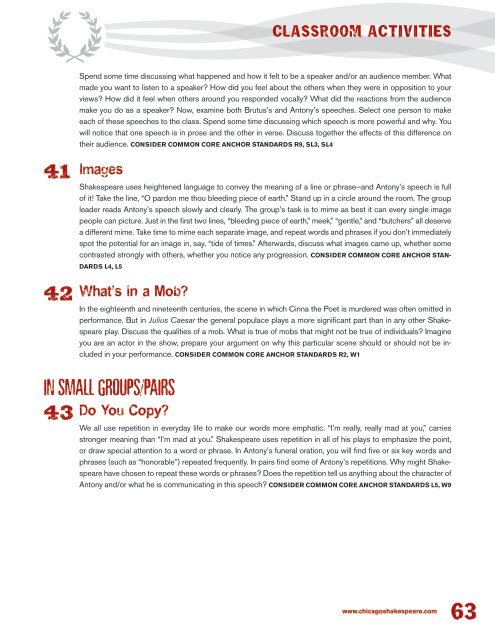Julius Caesar • 2013 - Chicago Shakespeare Theater
Julius Caesar • 2013 - Chicago Shakespeare Theater
Julius Caesar • 2013 - Chicago Shakespeare Theater
Create successful ePaper yourself
Turn your PDF publications into a flip-book with our unique Google optimized e-Paper software.
CLASSROOM ACTIVITIES<br />
Spend some time discussing what happened and how it felt to be a speaker and/or an audience member. What<br />
made you want to listen to a speaker? How did you feel about the others when they were in opposition to your<br />
views? How did it feel when others around you responded vocally? What did the reactions from the audience<br />
make you do as a speaker? Now, examine both Brutus’s and Antony’s speeches. Select one person to make<br />
each of these speeches to the class. Spend some time discussing which speech is more powerful and why. You<br />
will notice that one speech is in prose and the other in verse. Discuss together the effects of this difference on<br />
their audience. CONSIDER COMMON CORE ANCHOR STANDARDS R9, SL3, SL4<br />
41 Images<br />
<strong>Shakespeare</strong> uses heightened language to convey the meaning of a line or phrase—and Antony’s speech is full<br />
of it! Take the line, “O pardon me thou bleeding piece of earth.” Stand up in a circle around the room. The group<br />
leader reads Antony’s speech slowly and clearly. The group’s task is to mime as best it can every single image<br />
people can picture. Just in the first two lines, “bleeding piece of earth,” meek,” “gentle,” and “butchers” all deserve<br />
a different mime. Take time to mime each separate image, and repeat words and phrases if you don’t immediately<br />
spot the potential for an image in, say, “tide of times.” Afterwards, discuss what images came up, whether some<br />
contrasted strongly with others, whether you notice any progression. CONSIDER COMMON CORE ANCHOR STAN-<br />
DARDS L4, L5<br />
42<br />
What’s in a Mob?<br />
In the eighteenth and nineteenth centuries, the scene in which Cinna the Poet is murdered was often omitted in<br />
performance. But in <strong>Julius</strong> <strong>Caesar</strong> the general populace plays a more significant part than in any other <strong>Shakespeare</strong><br />
play. Discuss the qualities of a mob. What is true of mobs that might not be true of individuals? Imagine<br />
you are an actor in the show, prepare your argument on why this particular scene should or should not be included<br />
in your performance. CONSIDER COMMON CORE ANCHOR STANDARDS R2, W1<br />
IN SMALL GROUPS/PAIRS<br />
43 Do You Copy?<br />
We all use repetition in everyday life to make our words more emphatic. “I’m really, really mad at you,” carries<br />
stronger meaning than “I’m mad at you.” <strong>Shakespeare</strong> uses repetition in all of his plays to emphasize the point,<br />
or draw special attention to a word or phrase. In Antony’s funeral oration, you will find five or six key words and<br />
phrases (such as “honorable”) repeated frequently. In pairs find some of Antony’s repetitions. Why might <strong>Shakespeare</strong><br />
have chosen to repeat these words or phrases? Does the repetition tell us anything about the character of<br />
Antony and/or what he is communicating in this speech? CONSIDER COMMON CORE ANCHOR STANDARDS L5, W9<br />
www chicagoshakespeare com 63




